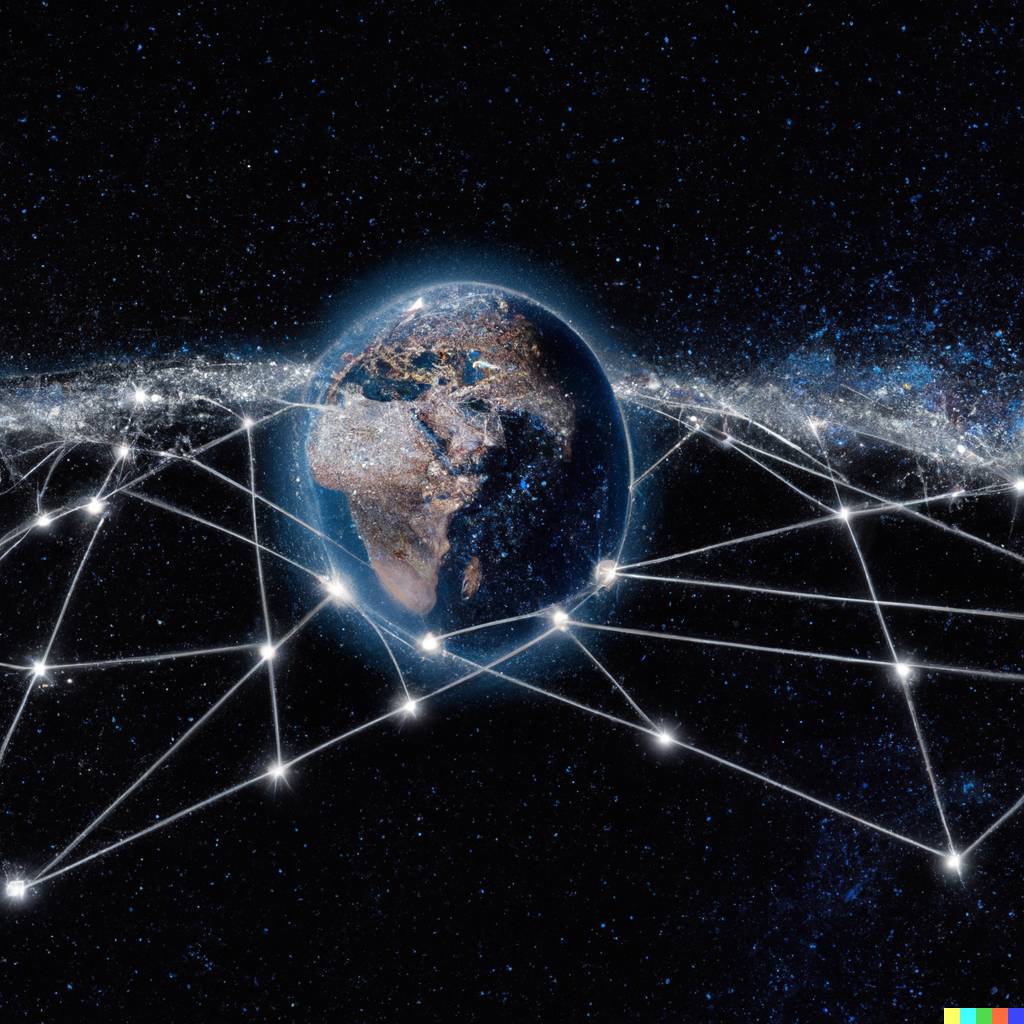Regardless how joyful or painful life is, I think that life is truly incredible! Our universe is inconceivably rich, full of opportunities, and it often reveals itself in so many unpredictable ways, it's just unreal!
I believe you can simply "ask" anything from the universe and there's a high chance you will get what you want. Knowing exactly what you want is super helpful and already solves half of the puzzle, so you can just focus on achieving your dream.
But here's the real challenge:
how to discover beneficial things, which you don't know they exist, which you would love to pursue? (having only 24 hours a day)
These things are called unknown unknowns. I consider the process of discovering useful unknown unknowns as one of the key challenges in my life.
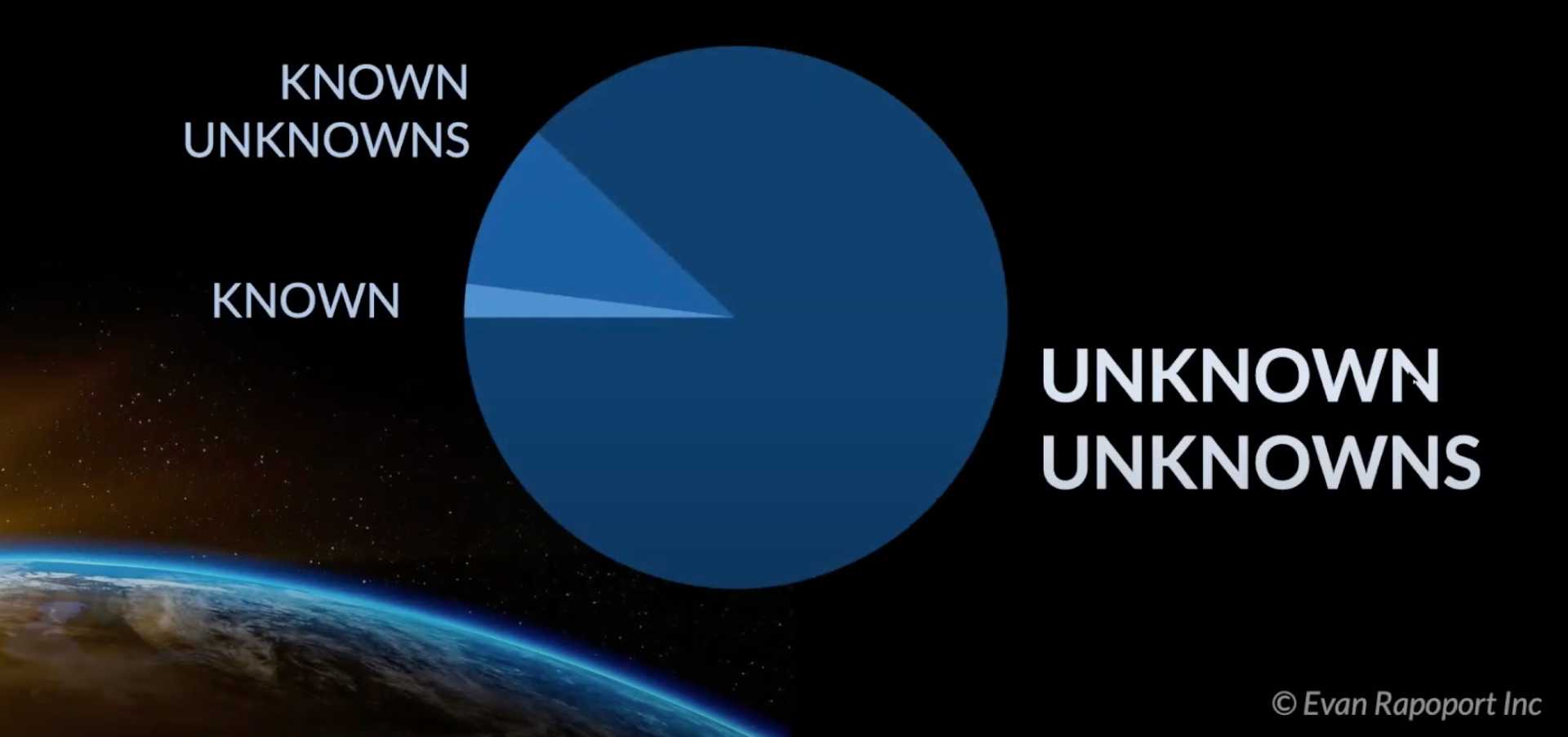
Below you can see my stream of consciousness. Hope it would be a thought provoking read for you.
Why?
[Diarrhoea problem] big negative reward, short feedback loop
Let's do a thought experiment. Imagine that you're about to die from diarrhoea because of a severe dehydration, and you just simply don't know that a little bit of special salt (electrolytes for rehydration therapy) could save your life. There's a handful of simple steps you (or someone for you) can do to avoid death, for example:
- find a building with a computer connected to internet,
- search somehow how to cure diarrhoea, find out about rehydration therapy,
- figure out where to find sodium, potassium, magnesium, etc.,
- take them, and save your life.
Sadly, millions of people die (about 2.2M kids only) every year because of that problem in the world! We need to solve it. I think to solve this problem we need help from the whole society to provide medical care, access to clean water, etc. I.e. it's not just the lack of knowledge.
But the point I wanted to make is that people end up in shitty situations in life, and there's often a few step solutions to these problems.
[Cardiovascular] big negative reward, long feedback loop
Now imagine that the feedback loop is much much longer. One of the biggest causes of mortality globally is cardiovascular diseases. People start developing them almost from birth. The symptoms appear many decades later. Could this risk be reduced? Of course yes, in many cases. Also there's information out there on how to do that. But it's really hard to combat this, because the feedback loop is super long, and the information is sometimes controversial.
[Living your best life] positive reward, long feedback loop
Now let's assume the reward function is not as bad, it's not killing you. If you choose the wrong path, you'll be alright.. I think this case is even harder than the previous two.
What if there's a handful of simple steps that you could do, which would make your life much much (or at least a little bit) better/interesting/joyful? And you're gonna think: "omg, how I lived without it, can't imagine it anymore!". How to discover those steps?
Luck plays a massive role in life. But I believe you can certainly pull a few levers here and there and make probability work for you, make your life better and make the world better (however you define the success metrics).
Universe as a graph
Getting a bit more abstract... Sometimes I think of my journey in life as following a path in a graph of the universe.
- nodes (or vertices) represent your state (e.g. intern at Google, having a certain lifestyle, etc), and
- edges represent your actions, or workstreams allowing to move into another state (e.g. pass interviews to become a full-time employee, or take music classes, etc)
This way our journey in life is just following along the edges from one state to another. Sometimes we're trying to find a shortest path (famous graph theory problem) from one state to another (e.g. you're a Computer Science student and thinking what is the fastest/easiest way to become a Software Engineer at a Big Tech company, or how to become a venture capitalist, etc).

Actually, not taking action is also an action (edge in the graph), and it leads either to the same state in life (loop), or to somewhere else, and definitely needs to be considered.
You're a role model for someone
Often we follow someone else's path in life. For example, when I was a student, I was actively participating in ACM ICPC (programming competitions), and I was a part of these communities. I've seen a lot of folks there have been going to the internships at Google, Facebook, etc. This was kind of a window into another world for me, which made my life 10x better, when I followed the same path.
Now I actually see a lot of people around with the similar background, who followed a similar path. But some people had a very different path and still ended up here. I can see this optionality now. It would be cool to come back to the younger version of myself and tell all these options, or give some tips on how to search for them.
I think it's also important to be aware of the fact that we all are role models for someone else. It would be great to do more deliberate activities towards empowering other people around, providing them optionality, figuring out ways to inspire them, because someone else inspired you!
Do you have mentors yourself btw?
Finding unknown edges
Here's what I learned from my experience (this is true for many people):
- Execution - I'm not too bad at moving along the edges. If I want something, and see a clear path how I can get there, I can execute on that, get things done, and just end up in the new state. Sometimes it's hard, but most of the time it's pretty much doable.
- Prioritising - If I see a bunch of different opportunities, things I can do that I'm aware of (i.e. edges going from the current state), I can choose a few opportunities to focus on (even though choosing the path you want to follow is quite hard at times). It's hard to drop things, and prioritise, but it's all manageable.
- Discovering unknown edges - I'm quite bad at figuring out what are the other options available. Who else could I be? What else could I try? What alternative paths exist? That's the biggest challenge.
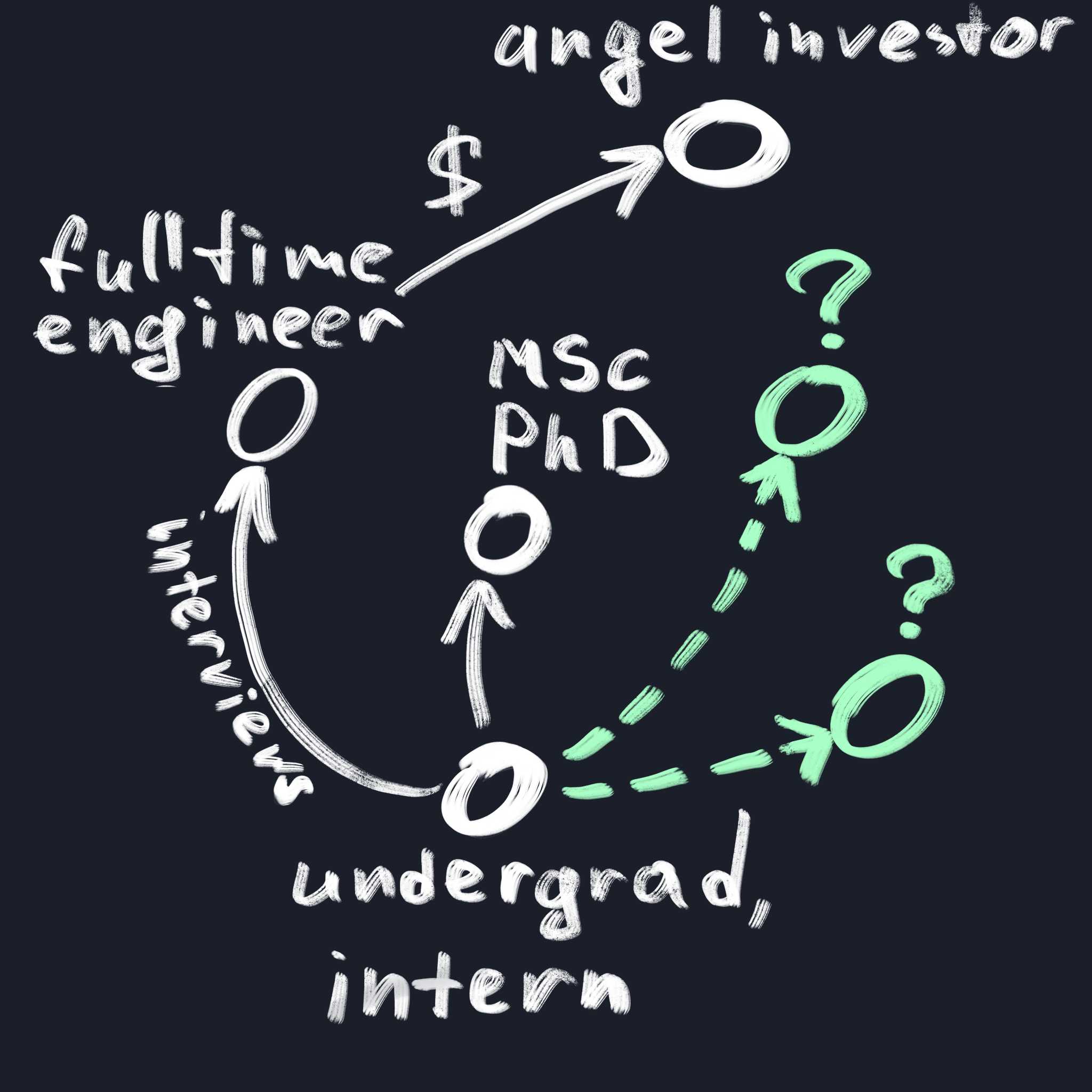
So, basically I'm looking for a better way to discover these unknown edges.
Strongly connected dense graph
Also I think we live in a strongly connected component (almost always you can achieve anything if you start anywhere, you just need to find a good path), and I think it's also a dense graph (i.e. almost everything is interconnected).
To unwrap this thought, I believe (on axiomatic level):
- There're often multiple ways to achieve the same thing.
- There's quite often a shortcut, i.e. you can get anywhere you want faster than conventionally.
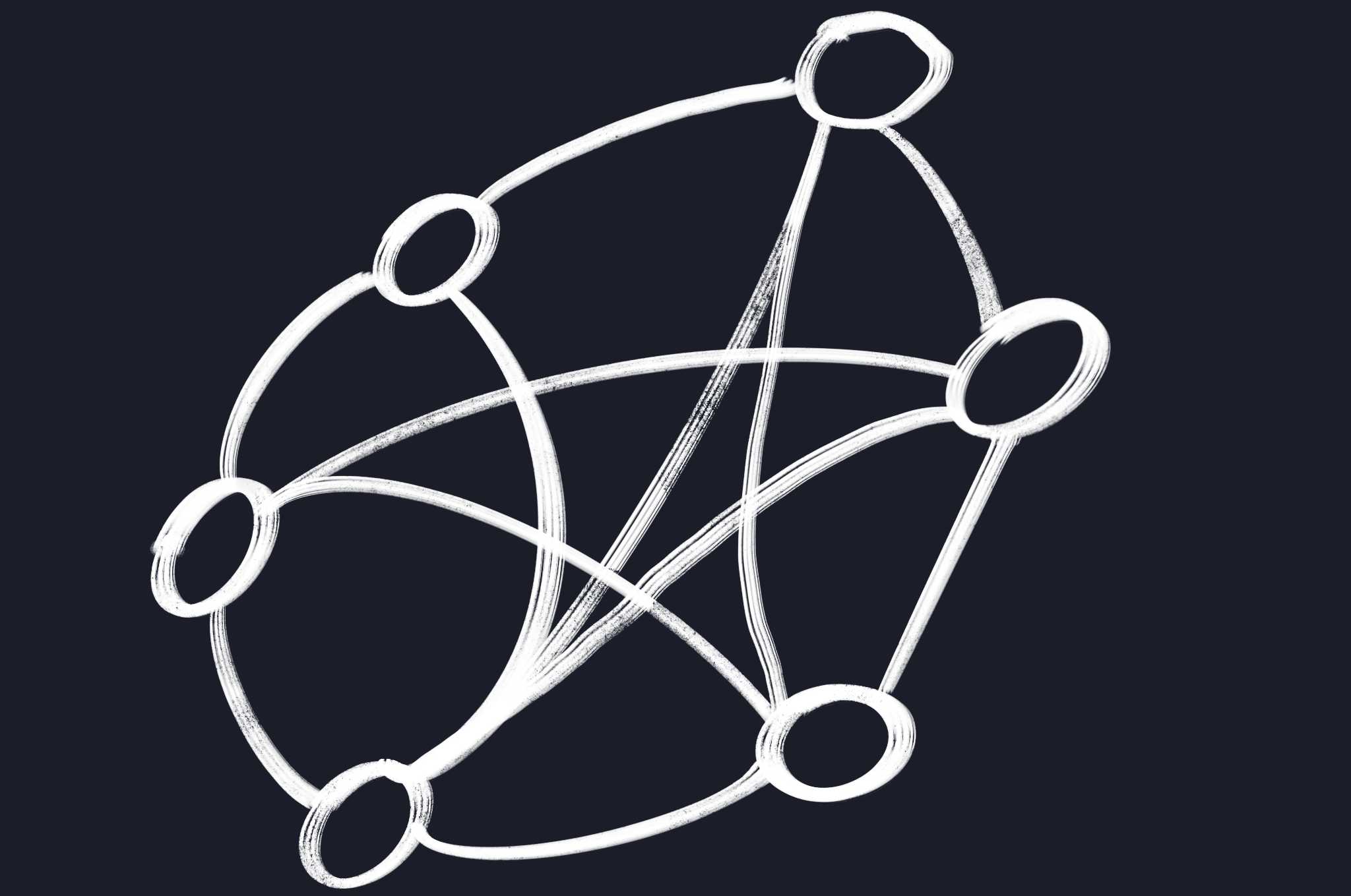
For example, if you're a 40-year-old Software Engineer, you don't need 20 years to be teaching a 20-year-old smart person to become as good as you, you can transfer your knowledge much faster.
Same way, you could just do a few simple steps to solve your diarrhoea dehydration problem...
If something is too hard, you're missing some insight
(which would later feel obvious).
Elon Musk told this on one of the podcasts I listened to.
Aliens
I always have this visualisation in my mind of aliens (or god, or future people in 1000 years, or some external observer) watching and laughing at me: "aah, Sergei is such an idiot... There were just two simple steps to figure it out, and all the necessary information was already out there in abundance, but he didn't make an effort and failed". Sometimes this thought keeps me going. I also love an analogy that our Universe is a giant escape room (Liv Boeree), and you just need to find a key.
Be ready
Timing (or actually the state where you are in the graph) matters a lot. Not all the useful things would be useful for you.
If you don't know how to read, you can't enjoy books, you need to learn how to read first (actually, this is not true, because you can still listen to audio books).
The field of sustainability seemed important but super boring for me in the past. Before I actually started working in it, and discovered a fascinating world.
Knowing about the UK Tier 1 visa helped me save two years to get British settlement. This would be just extra noise if I was not living in the UK, nor planning to move to the UK.
Many things would be irrelevant and not useful for you at this stage, and it's fine. But you can definitely expand the scope by moving in the graph and discovering new things. And also trying to find alternative ways to broaden your scope (e.g. listening to audio books when you can't read).
Funnels
I have a feeling that if I were to design a system to discover these useful unknown unknowns, it would have some funnels on it's core:
- On one end of a funnel we're trying to absorb as many ideas as possible.
- On the other end we'd need to find a way to make use of these ideas and filter the most relevant, promising ones.
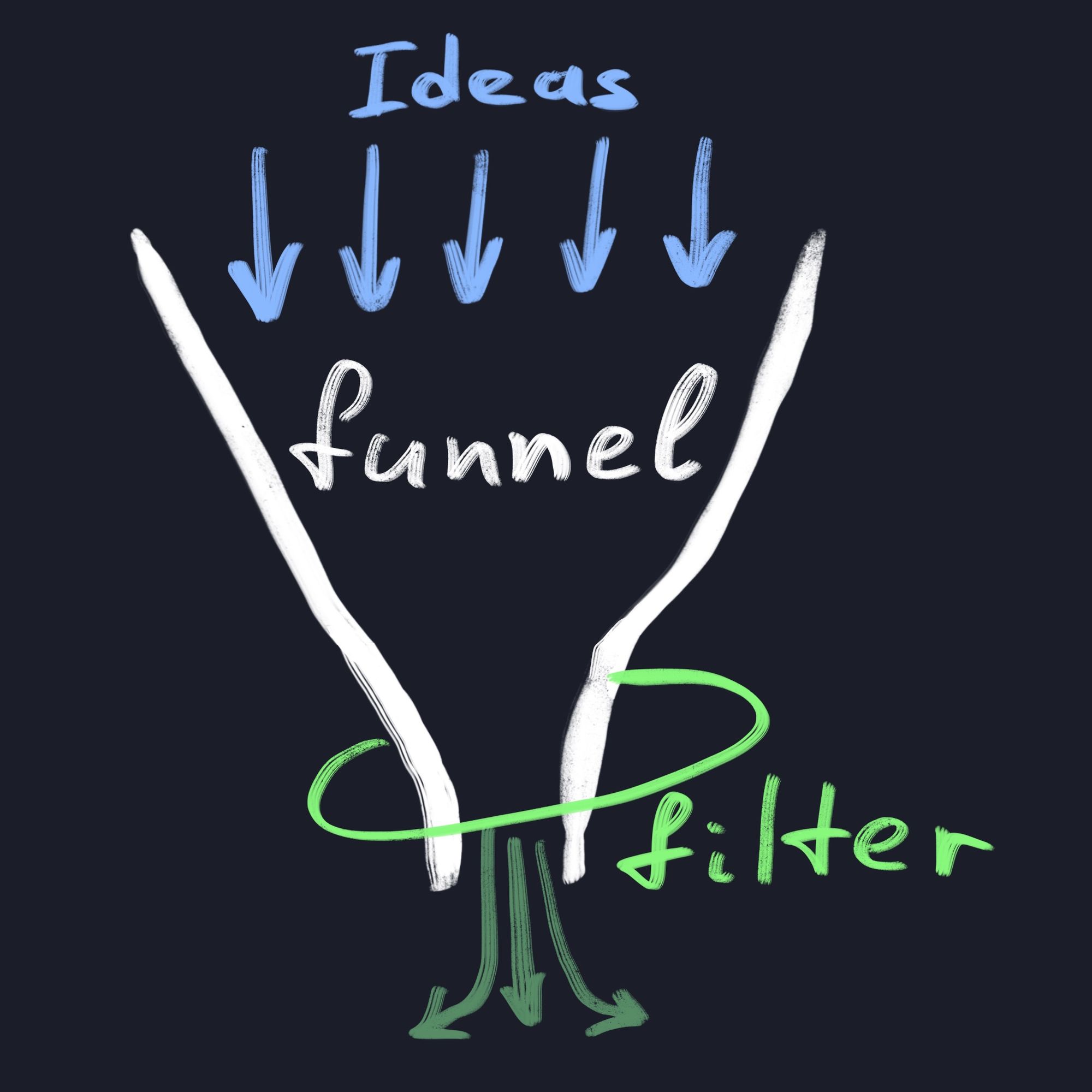
Also I believe we need to search for sources of information and people with diverse perspectives.
Heuristics
I don't know all the answers, but I'll start listing out some ideas/tactics here that come to my mind and seem relevant. And maybe later we'll see common patterns and figure out a way to design this framework.
1. Read more & hang out with people more
This is super generic and not helpful at all. But it all comes down to finding good sources of information and processing this information.
People are super important, they changed my life so many times! I think you're a product of your environment, you're a product of people that surround you. You are what you read (or listen to in case of audiobooks, podcasts). Search for and join interesting communities.
2. Mining ideas
Surface of surrounding ideas is not uniform. Some ideas seem to be more valuable and relevant. Some places have much better ideas. Also it's hard work to find good quality ideas, so I compare it to mining. It would be great to "prioritise things, where you can learn the most, first" (by Astro Teller).
3. Hire analysts
I'm a big fan of Peter Attia - he's a physician known for his medical practice that focuses on longevity. He's a host of the brilliant podcast The Drive. He's done a lot of things in life, starting from ultra-long swimming to racing cars, etc. Peter has a very engineering / scientific approach to things.
He says that on average every 3 minutes a paper is published in his area of interest, and 99% of them are not the best quality, or not relevant. So he hires a bunch of full-time analysts, experts in the field, helping him out to read all the papers and do initial filtering, so he can read the most promising ones (by the criteria he chose).
Maybe consider even crowdsourcing something you're searching for.
4. Harry Potter
One of the books that changed my life is Harry Potter and the Methods of Rationality. I've read it three times and it's truly brilliant! It's a fanfic written by Eliezer Yudkowsky. Harry Potter is a little mathematician, who uses scientific method to get to the fundamentals of reality, and basically hack it in many ways. It's super fan and touches a lot of interesting points, e.g. highlights various cognitive biases and how to get rid of them.
The book originated as a thread of blog posts in the author's blog LessWrong. It has a ton of interesting information.
It changes your perspective, so you start seeing the world through the lens of experiments. This is a super useful skill which needs to be improved!
I found this on Codeforces in 2014, and it changed my life. If you know something similar, please let me know.
5. Effective Altruism and 80,000 Hours
There's also an Effective Altruism - which is a philosophy and community focused on maximising the good you can do through your career, projects, and donations (thanks Sam Liu for recommending it). They are trying to use scientific method and rationality as well.
Especially, check out the 80,000 Hours (kudos Pesho Ivanov for suggesting).
I think there's something cool about these two in their approach to life and tackling things. At least it would be useful to go through the links they provide, visit some of their events.
6. Tap into the brains of your existing network
Ask for book recommendations, or what would be the great people to connect with, etc. Try actively leveraging your network, there's a great power and wisdom in there.
It's super cool to have chats (e.g. ecology-focused ML researchers, or just a bunch of friends), where you can throw some questions to find more references, or validate your ideas quickly.
7. Brainstorms
Participate or organise brainstorm sessions to more effectively come up with ideas, exchange ideas and figure out the way forward. We do that quite often at work. But why not apply this in a regular life? The Workshopper Playbook is a great place to start (kudos Edyta Jaworek for suggesting!)
8. Events
Go to different events. Create a list of events/conferences to visit. Ask your friends (interested in the same topic) to help you by adding more events there. I think it's important to actively search for them and participate.
9. Dinners
Another option is to host events yourself, it could be just dinner, e.g. BBQ. You could bring in folks, some with fresh ideas, and try connecting them. That would be super important for people and would help you as well.
I'm trying to explore how to make it effectively and better. For now I found Jon Levi (behavioural scientist famous for his dinners) You're invited book. I found it in this talk of David Burkus, who written a book "Friend of a Friend: understanding the hidden networks that can transform your life and your career".
Note: I only watched their talks, and haven't read the books yet, but I'm curious to find more resources on that topic. Jon assigns tasks to people (e.g. cooking something together), this allows better bonding.
10. Ask people you admire
Sample people you admire (e.g. choose top 10 people). List why you admire them, what qualities make you attractive. Find more people with these qualities, read biographies of these people. Even ask them questions directly (brilliant advice by Thomas Rothörl).
E.g. I do freediving, so I reached out to the world's deepest freediver Alexey Molchanov (24 world records, 131m/430f depth on one breath) on instagram, and managed to grab a coffee with him. If you have good questions, people would help you, if they have time. A lot of cool people are willing to help and give back!
Find someone who you wanna be and ask them questions directly.
11. Search in big collections
Elon Musk told when he was a kid, he was sometimes just reading encyclopaedia articles to discover new things. I think it's a cool way of discovering unknown unknowns.
I was recently reading descriptions of MSc programs in Imperial (and other universities) to better understand the landscape of careers people have, and try thinking if anything from there would be a good fit for me.
I really enjoyed reading emerging spaces list at PitchBook (thanks Peter Zhegin posting it in your blog).
12. Smart search in Databases
Similarly you can search in LinkedIn, Crunchbase (or similar places).. You can find people who had similar backgrounds to you (e.g. was or still in the same area), and see what they are up to now. And maybe grab a coffee if you're in the same city, or just reach out and ask question.
I used to be an intern at Google in 2016 in California. And I desperately wanted to be full-time at SpaceX. So I found on LinkedIn a few people (who used to be interns at Google a few years ago, and now work as FTEs at SpaceX), and asked how they compare companies and jobs, and how to move there. It was very insightful. Thought you can't work at SpaceX if you're not a US citizen, so it didn't work out.
But in general this is a cool thing, you can find people this way and try expanding your horizon.
13. Tinder pipeline
A friend of a friend was super tired of endless swiping left and right in Tinder in the hope to find a perfect match. So they manually labelled a few thousands of profiles and trained an ML model to classify whether they are gonna swipe left or right. After that they deployed the model to be running 24/7 and finding new people. Once someone new matched and replied on the first message, they were getting phone notifications, and engaging personally.
I think I'm getting too far here, and should stop, haha... But I think this is a fascinating example of applying engineering in life.
14. Marketing campaign
Similarly, you could try figuring out your target audience first (e.g. get a list of emails or profiles, basically people selected by some criteria), and then you could run a marketing campaign, e.g. advertise your Instagram profile, or advertise your blog, so relevant people could find you and engage with you (kudos Max for the idea!).
15. Someone's blogs and notes
I love reading someone else's blogs (e.g. Greg Brockman - CTO of OpenAI has a quite similar interests to me, but many years ahead in terms of careers, to it's cool to learn from it), they usually have a lot of cool links or sometimes.
16. Build a crew
It's quite hard to do things alone. Same as if you go to the gym, it's much harder alone (especially at the beginning), so find you training buddies and build a crew.
Think which gaps (lack of skills or knowledge, or time to invest) do you have?
E.g. you're bad at cooking but you want to organise a dinner. Why not cooperate with a person who loves cooking and would be glad to be at your dinner? Find someone who could help entertain people, etc.
I think this is applicable not only to the weak sides of you, that need to be covered, but to every area of life. E.g. you value the gym, find top professionals in that area and go there with them. Or you want to create YouTube videos. Find top YouTube creators, etc. Surround yourself with these amazing people.
17. Join a platform that can accelerate you
I've seen director-level people who are actively searching for a platform that can accelerate them. E.g. when I was a student and joined Google, it was a platform that gave me a boost (we can call it a social lift as well I guess). Think of which other platforms it would be good to join to get this acceleration. Which platforms would you join?
18. Travel
Traveling is a great way to discover unknown unknowns, meet incredible people that could change your life, learn more about different cultures, helps to start thinking outside the box.
19. Reflect
I think it's super useful to just reflect on your life once in a while, e.g. have retrospectives every month or half a year (whatever cadence works for you). You can analyse what worked in the past, which type of activities / events / people bring you the most joy. And double-down into those, or search for similar ones.
Framework
Now we have a list of heuristics/tactics to discover the unknown unknowns. You could add more of your favourite tactics to the list.
To build a working system customised for you we can now:
- Select a subset of the most promising heuristics
with highest (value * risk / effort) score. - Establish metrics (e.g. how many events converted into success later).
- Setup tracking system (e.g. a spreadsheet where you have a list of events to visit, etc).
- Create these funnels to help you gather cool information.
That's my approach to that, but I'm not as organised yet to establish good metrics, etc. I think it's good to start small and follow your intuition.
How would you approach this?
Conclusion
In my case luck played a massive role, I'm super grateful to the universe for that. But I probably wouldn't also end up in that fascinating world of bees, pests, mangoes doing engineering, surrounded by incredible people, if not trying actively to search for opportunities. To summarise:
- Remember aliens are watching, please don't die of diarrhoea anymore!
- Design a framework to systematically discover useful unknown unknowns.
- Think of how to share your knowledge at scale, how to empower other people, how to be a better role model.
The only true limit is our imagination! (Kurzgesagt)
Please help me improve my writing 🙏


